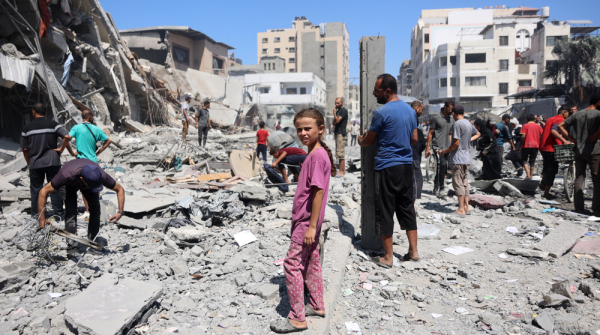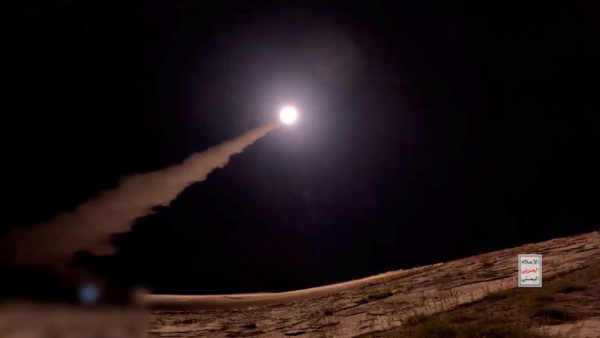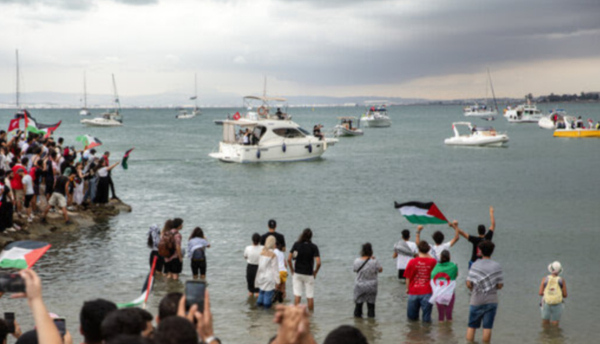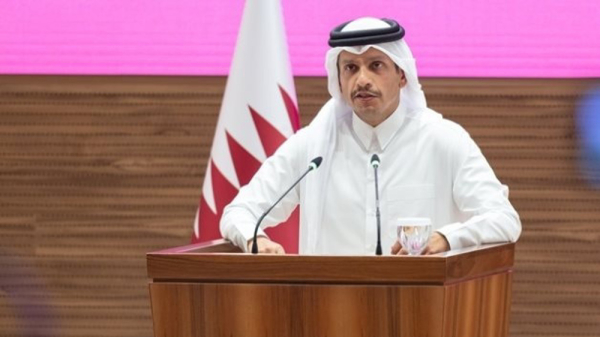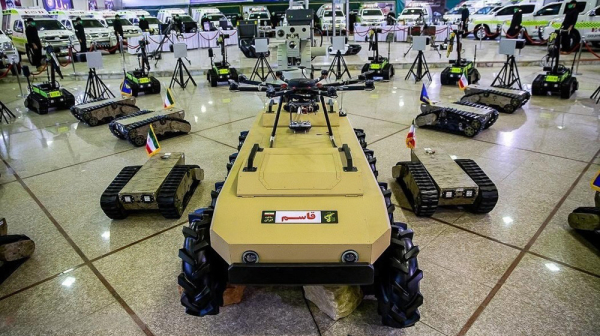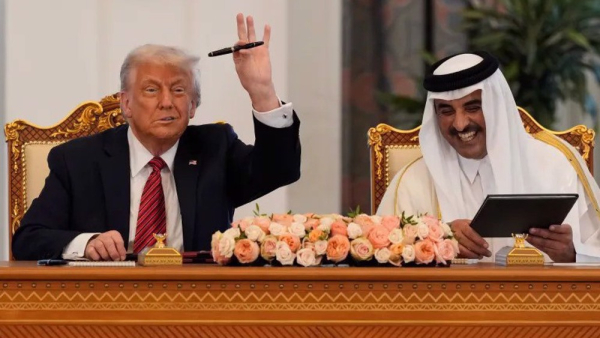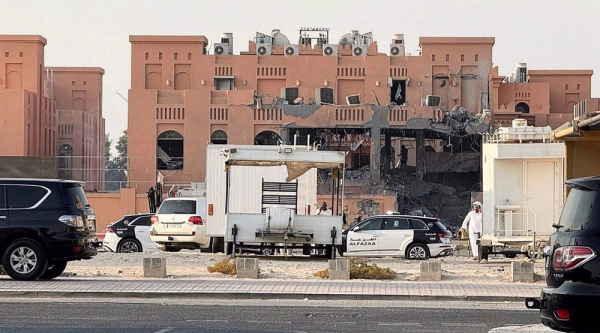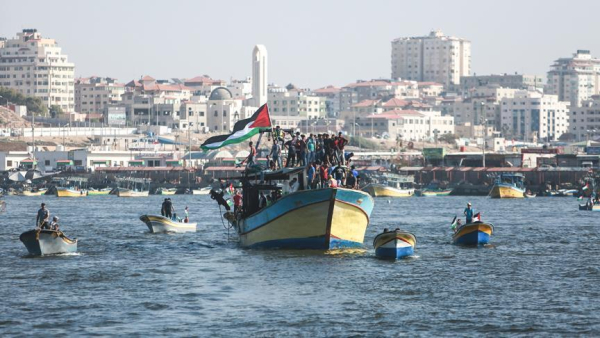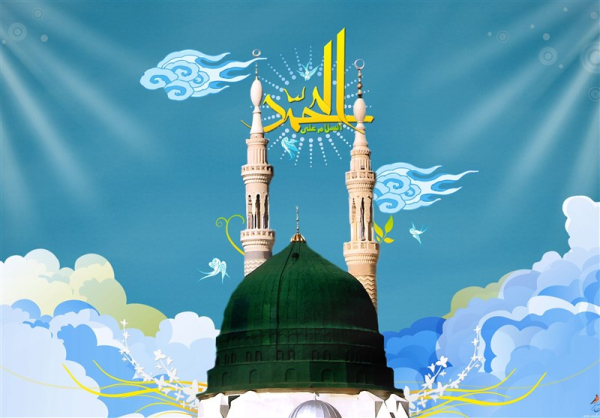zarezadeh
Silence is complicity: Iran calls for moral action against Israeli genocide, urges accountability
The spokesman for Iran’s Foreign Ministry has rejected the extension of the “true” principle of “neutrality in times of war” to the Israeli regime’s ongoing genocide in occupied Palestine.
In a post on his X account on Friday, Esmaeil Baghaei said it is true that neutrality in times of war is not indifference.
“But war and GENOCIDE are inherently different.”
Underscoring moral imperative against Israeli genocide, Baghaei said neutrality in the times of war cannot be applied when the regime has been committing an “undisguised genocide” in broad daylight against the people of Palestine for the past two years.
Genuine humanitarianism calls for moral courage to explicitly abhor atrocious crimes and demand accountability for the Zionist criminals, the Iranian spokesperson stated.
Baghaei’s post came after the UN special rapporteur on the occupied Palestinian territories Francesca Albanese wrote on X on September 9 that the work of the International Committee of the Red Cross (ICRC) and other humanitarian organizations is vital, asserting that neutrality in war is essential.
Israel has launched a genocidal war on Gaza since October 7, 2023, after Palestinian resistance fighters waged the surprise Operation Al-Aqsa Flood against the Zionist entity in response to the regime's decades-long campaign of bloodletting and devastation against Palestinians.
Since March 2, the Israeli regime has sealed all border crossings, blocking the entry of humanitarian aid and further deepening Gaza’s already dire humanitarian crisis.
The regime’s bloody onslaught on Gaza has so far killed at least 64,750 Palestinians, mostly women and children, according to the health ministry of Gaza.
Israel is pushing forward with a plan to occupy the Gaza Strip, starting with Gaza City, the largest city in the territory.
Sirens sound across Israeli-occupied territories after Yemen launches new missile attack
Air raid sirens have been activated in the Israeli-occupied territories after the Yemeni Armed Forces launched a ballistic missile in response to Israel's genocidal war on Gaza.
As reported by Israeli media, a new missile strike originating from Yemen sounded sirens in Tel Aviv and other communities across the occupied lands early on Saturday.
The missile attack caused widespread panic among illegal settlers, pushing hundreds of thousands of them to seek refuge in bomb shelters.
Israel's Magen David Adom (MDA) emergency response service has not reported any direct injuries resulting from the attack or from debris impacts.
The military subsequently asserted that its anti-air missile systems “intercepted” the projectile.
The development came two days after the Yemeni military claimed responsibility for a series of airstrikes against Israeli positions, using a “hypersonic ballistic missile” and three drones.
The Yemeni military spokesperson, Brigadier General Yahya Saree, said on Thursday that the missile and one drone targeted designated sites at the Negev desert, while two other drones were aimed at Ramon Airport in the southern city of Eilat. He described the attacks as “successful.”
The Moroccan Sumud flotilla will sail towards the Gaza Strip this Saturday to break the blockade of Gaza.
According to Mehr News Agency, citing the publication, the Moroccan Stability Fleet announced in a press conference that 23 ships belonging to this fleet will head to the port of Bizerte in northern Morocco on Saturday to depart for the Gaza Strip. The fleet hopes to break the siege despite the news that the Zionist regime is obstructing their movement.
This was stated in a press conference in which Ghassan Al-Hanchari and Nabil Al-Shanoufi, members of the board of directors of the Moroccan Stability Fleet, spoke in the port of Sidi Bou Said in northern Tunisia.
Al-Hanchari said: "We have 23 ships ready to leave and we have received facilities from the authorities regarding the entry of ships from Spain to Tunisia."
Al-Shanoufi also explained that the number of Moroccan ships that will leave Tunisia is 23 ships that will be stationed in the ports of Sidi Bou Said and Qamrat, and that European ships will gradually arrive in the port of Bizerte in the coming days.
Qatari PM slams Israeli airstrikes on Doha as act of ‘state terrorism’
Qatar’s Prime Minister, Sheikh Mohammed bin Abdulrahman Al Thani, strongly condemned Israel’s strike against Hamas’s political leadership in Doha, calling it an act of “state terrorism.”
Qatar’s Ministry of Foreign Affairs (MFA) issued an official statement today, summarizing the key points from Tuesday night’s press conference.
The statement reinforced the prime minister’s condemnation and emphasized Doha’s stance against Israel’s blatant violation of sovereignty and international norms.
The Qatari PM stated that the Israeli prime minister Benjamin Netanyahu threatened regional security and violated the sovereignty of nearby nations.
“These barbaric actions only reflect the barbarism of this person, who is dragging the region to a place where it unfortunately cannot be repaired.”
Israel sends “a clear message to the entire region: There is a rogue actor engaging in constant political thuggery in this region and violating the sovereignty of its states," he added.
Al Thani, who also serves as Qatar's Foreign Minister, further affirmed that the state of Qatar will not tolerate any “violation of its sovereignty, territorial integrity, or security.”
The top Qatari diplomat strongly criticized Netanyahu for previously declaring intentions to reshape the West Asia region.
Al Thani questioned whether the latest Israeli reckless actions were meant as a threat to reshape the Arab states of the Persian Gulf region.
Last month Netanyahu said that he feels a deep connection to "this vision" of a “Greater Israel,” referring to the Israeli-occupied Palestinian territories as well as parts of Egypt, Jordan, Syria, and Lebanon, and described it as “a historical and spiritual mission.”
The Qatari official denied claims that the state of Qatar had received prior notification from the United States before the Israeli attack.
Revisiting calls for Muslim unity on Prophet Muhammad’s 1,500th birth anniversary
By Humaira Ahad
Tehran appears particularly vibrant these days, alive with a sense of togetherness, as Iranians prepare to mark the 1,500th birth anniversary of Prophet Muhammad (PBUH).
Across the capital city, banners stretch over streets and squares, expressing devotion to the Holy Prophet (PBUH) and carrying messages of Shia-Sunni unity.
Passersby often pause to take pictures, reflecting on centuries of shared faith, while the capital itself transforms into a canvas echoing the timeless message of brotherhood that the Islamic Republic of Iran has long championed.
These displays of unity serve as a living tribute to a vision first articulated decades ago by the founder of the Islamic Revolution, Imam Khomeini, and carried forward by Leader of the Islamic Revolution, Ayatollah Seyyed Ali Khamenei.
Imam Khomeini remains one of the most influential figures in Islamic history, remembered for his sincere and tireless efforts to bridge the divide between Shia and Sunni Muslims.
His revolutionary leadership went far beyond political changes within Iran, where he led the struggle against the West-backed Pahlavi dictatorship. He actively promoted Islamic unity across sects, championing a cause that has left a lasting impact on the Muslim world.
His far-sighted vision sought to rise above sectarian differences and forge an unbreakable bond of brotherhood by focusing on the shared foundations of Islam.
Muslim Unity Week
One of Imam Khomeini’s most important initiatives to foster unity was the introduction of Unity Week to commemorate the birth of the Prophet Muhammad (PBUH). Traditionally, Sunnis mark the Prophet’s birth on the 12th of Rabi’ al-Awwal, while Shias observe it on the 17th.
Rather than allowing these differences to deepen divides, Imam Khomeini proposed that the entire period between the two dates be celebrated as a week of unity and brotherhood.
His vision was for Muslims to shift their focus from what separates them to what unites them—their shared devotion and reverence for the Prophet (PBUH).
Since then, Unity Week has become a platform for Muslims of both sects to come together, engage in dialogue, and reaffirm their commitment to the core principles of Islam..
Imam Khomeini’s efforts in establishing this tradition have had a lasting impact, as Unity Week continues to be celebrated in Iran and other parts of the Muslim world, serving as a reminder of the importance of Shia-Sunni collaboration and mutual respect.
Imam Khomeini frequently invoked Qur’anic principles to underline the urgency of unity.
"We must be awake and know that the divine judgment says: 'The believers are but brothers.' There is nothing among them other than brotherhood, and they are obliged to have brotherly conduct. It is a political point to have all Muslim nations, nearly a billion in number, to be brothers to one another, in which case no harm may befall them, and none of the superpowers will be able to transgress them. Pay attention to this! Sunnis and Shias are brothers and should avoid all disputes," he once said.
"We must pay attention that we are all Muslims and we all believe in the Qur’an; we all believe in Tawheed and must work to serve the Qur’an and Tawheed. The Muslims must be united in hand against all arrogance. If the Muslims were a united, single fist, none could rise against them."
He also warned Muslims against divisive propaganda: "Muslims are brothers and will not be segregated by the pseudo-propaganda sponsored by corrupt elements. The source of this matter, that Shiites should be on one side and Sunnis on the other, is, on the one hand, ignorance and, on the other hand, propaganda of the foreigners."
In one of his addresses to the Muslim world, Imam Khomeini declared, "You powerful Muslims! Beware! Know yourselves and let the world know you. Cast aside the sectarian and regional disputes, which have been created by the world-devouring powers and their corrupt agents for the purpose of plundering you and treading upon your human and Islamic honour... May Allah, the Highest, deliver Islam and the Muslim countries from the evil of the world devourers and their affiliated and connected agents."
The founder-leader of the Islamic Revolution, who inspired an entire generation of truth seekers worldwide, warned of global forces seeking to exploit the division between Muslims.
"Today, all Islamic denominations are facing the satanic powers who want to uproot Islam because they know that the unity of the Muslim nations would not be in their interest. Today is the day on which all the Muslims of the whole world must come together,” he said.
“Today is not the day for a group in one place to say: 'Only we', and another group in another place to say: 'Only we'. Today is the time when all are to be united based on the rule of Islam and the judgments of the Qur’an. The dispute among Muslims, in whatever way it may be, is prohibited by the Qur’an. Dispute will bring them failure and efface the attractive qualities of man. This is the command of Allah, the Generous."
Imam Khomeini also condemned those who fomented disunity between Shias and Sunnis.
“Those who try to create disunity, and yet claim to be Muslims, have not found the Islam whose Book is the Qur’an, the Islam in which the Ka’bah is the Qiblah. They do not believe in Islam. The ones who believe in Islam are those who accept the Qur’an, which says: 'The believers are but brothers.' So they must comply with what the brotherhood requires. Brotherhood requires that if some misfortune happens to one brother, other brothers should sympathise with him, and if anything happy happens to him, they all should be happy, too," he emphasised.
Leader’s calls for unity
The vision of unity promoted by Imam Khomeini has been carried forward by the Leader of the Islamic Revolution, Ayatollah Seyyed Ali Khamenei.
In 2024, Ayatollah Khamenei urged Sunni scholars to rely on the Islamic identity and the collective strength of the Ummah, warning against the malicious activities of ill-wishers who seek to exploit religious differences. He underlined that these forces employ intellectual, propagandistic, and economic means to divide Muslims.
Ayatollah Khamenei has often stressed that unity is not a political manoeuvre but a divine command: “The issue of unity is not a tactic but a Qur’anic principle. The issue of the Islamic Ummah’s identity is a fundamental issue beyond nationality, and geographical boundaries do not change the truth and identity of the Islamic Ummah,” he said once.
The Leader has also highlighted the steadfast role of the Sunni community in defending unity, noting “the 15,000 Sunni martyrs in the Sacred Defence and other periods, as well as the martyrdom of a large number of Sunni scholars for the sake of truth and the revolution.”
“We see that our collective religious knowledge is the same. Our monotheism is the same. Our conception of returning to God is the same. Our conception of prophethood is the same. Our daily prayers and fasting are the same. Our hajj is the same. Our enemies are the same. Our goals, ideals and interests are intertwined. How can Muslim nations, Shia or Sunni, be separate from one another? The enemy wants to impose this on us…”
From the earliest days of the Islamic Republic, the support for Palestine has been unwavering in his speeches: “Since the first day, the Islamic Republic has stood by its Palestinian brothers… Our Palestinian brothers used to consider our country as their own home. They still have the same feeling: they come and go.”
The Leader also drew a clear parallel in one of his speeches: “The arrogant powers’ attitude and behaviour toward the Palestinian Hamas is the same as their attitude and behaviour toward the Lebanese Hezbollah; the first is Sunni and the second is Shia. The attitude of the global arrogance toward faithful and committed Muslims living in any part of the world is the same, and it does not make any difference to arrogant powers whether those Muslims are Shia or Sunni.”
Emphasising the moral weight of unity, Ayatollah Khamenei declared, “The dignity of the Islamic Ummah can only be achieved through unity. Today, supporting the oppressed people of Gaza and Palestine (mostly Sunnis) is an essential duty. Anyone who ignores this duty will be held accountable before God.”
Reflecting on historical experience, he said in 2022, “When there is conflict between you, it causes frailty and weakness. ‘And your power will be gone’ is the same as saying ‘your dignity’ will be gone. Whenever there is a dispute between you, you will definitely become miserable, and you will certainly allow others to dominate you. That is the result of division… They planted the rotten seed, this cancerous cell in this region called the Zionist regime, to serve as a base for Western enmity against Islam.”
On sectarian differences, he clarified in 2013, “The existence of differences between Islamic denominations and between Shia and Sunni Muslims will not create any problem as long as these differences are confined to ideological differences… Problems arise when these ideological differences lead to behavioural differences, confrontation, hostility and enmity.”
“The enemies of the world of Islam are after creating such a situation and hatching such a plot. They have properly understood that the Zionist regime can breathe easily if Islamic denominations in the world of Islam start confronting and fighting with one another.”
Ayatollah Sistani on Muslim unity
Ayatollah Ali Sistani, the top spiritual authority in Iraq, has long echoed and supported Imam Khomeini and Ayatollah Khamenei’s calls for unity among Muslims.
In 2007, he issued a landmark message, later reaffirmed amid Takfiri terrorist attacks in Iraq.
“There is no real difference between Shiite and Sunni beliefs, and I am the servant of all Iraqis (either Sunni or Shiite). I love everyone, and this religion (Islam) is the religion of love,” he said in an immortal message.
He explained the practical importance of solidarity: “Shiites should defend Sunnis’ social and political rights before defending their own rights, and we call (everyone) for unity. We should attend Sunnis’ Friday prayers more than Shiites. We do not discriminate between Arabs and Kurds, and Islam has collected all of us (under a common umbrella).”
Ayatollah Sistani summed up his vision of unity in these words: “Do not use the term Sunni brothers, but say they are ourselves (our soul) because we are from the same origin and there is no difference between us and them.”
Sunni voices on unity
In 2011, Ayatollah Khamenei spoke about his experiences with Sunni scholars while in exile in Sistan and Baluchestan province during the Western-backed Pahlavi regime.
"I myself had been exiled to Sistan and Baluchestan Province, and since those days I've been friends with Hanafi Sunni scholars from cities of Sistan and Baluchestan Province, Iranshahr, Chabahar, Saravan and Zahedan. I have been in contact with brothers who are living today, and we remain close friends,” he recounted.
“While I was living in exile there, governmental organisations would not let us engage in any activities; nonetheless, we decided to do something to exhibit a sign of Shia-Sunni unity in the city. The idea of Unity Week, the birth anniversary of the Holy Prophet (peace be upon him), which is on the 12th of Rabi al-Awwal according to Sunni scholars and the 17th of Rabi al-Awwal according to Shia scholars, came to mind, and we implemented it in Iranshahr: we celebrated from the 12th to the 17th of Rabi al-Awwal. This took deep consideration and was not a recent innovation."
Calls for unity between Sunni and Shia Muslims have echoed across Sunni Islamic scholarship, with Egypt’s prestigious Al-Azhar University often at the centre of this message.
Shaikh Mahmood Shaltoot, a former head of Al-Azhar, emphasised collaboration with Shi’a scholars and also oversaw the creation of Dar al-Taqreeb al-Madhahib al-Islamiyyah, a pioneering centre aimed at bringing Islamic schools of thought closer together.
That legacy continues today. Sheikh Ahmed al-Tayeb, the Grand Imam of Al-Azhar, declared, “I and major scholars of Al-Azhar and the Muslim Council of Elders are ready with open arms to sit down together on one roundtable with our Shia brothers to put aside our differences and strengthen our Islamic unity.”
Former Egyptian Grand Mufti Vasel Nasr voiced similar hope, praying that God would “create unity among Muslims and remove any enmity, disagreement and contention in the ancillaries of Fiqh (jurisprudence).”
Former Grand Mufti of Egypt and the head of al-Azhar, Muhammad Sayyid Tantawy, underscored the principle, “Anyone who believes that there is no god but Allah and that Muhammad is his Messenger is definitely a Muslim… Muslims should strive to become united and protect themselves from denominational sectarian fragmentation. There are no Shiites and no Sunnis. We are all Muslims.”
Prominent Sunni Islamic Scholar Sheikh Mohammed al-Ghazali likewise affirmed: “It is the duty of all Muslims to unite against enemies of Islam and their propaganda.”
A central theme in al-Ghazali’s work was the concept of Ummah unity. He argued that divisions within the Muslim community undermined its strength and effectiveness in addressing contemporary challenges. Al-Ghazali believed that fostering a sense of solidarity among Muslims was essential for countering both external threats and internal discord.
These voices echoed an earlier exchange between Ayatollah Seyyed Hossein Borujerdi of Iran and Sheikh Abd al-Majid Salim, a former Grand Mufti of Al-Azhar. Writing in the mid-20th century, Borujerdi prayed for an end to “ignorance, separation and division among Islamic schools,” hoping instead for “knowledge, kindness and solidarity.”
As Tehran’s streets glow with banners calling for unity, the city embodies a message that has resonated through generations: Islam’s strength lies in its togetherness.
From Imam Khomeini’s visionary establishment of Unity Week to Ayatollah Khamenei’s repeated calls for solidarity, reinforced by the voices of Sunni scholars, the message is that sectarian divides are artificial constructs, easily exploited by external forces, but fundamentally irrelevant to the core of Islam.
In marking the Holy Prophet’s (PBUH) 1,500th birth anniversary, streets across Iran these days project a vision for the present and future. Muslims are brothers, and only together can they uphold the dignity, strength, and promise of Islam.
Press TV’s website
From Qassem to Nazir, Iran’s next-generation military robotics redefining deterrence
By Ivan Kesic
The Islamic Republic of Iran has firmly established itself as a pioneering force in the development and deployment of advanced military robotics, a testament to its unwavering commitment to technological self-sufficiency and strategic deterrence in the face of complex regional and trans-regional threats.
Through decades of dedicated research and innovation, Iran's armed forces have successfully designed and manufactured a diverse array of unmanned ground vehicles (UGVs) that are reshaping the modern battlefield, enhancing operational capabilities while significantly reducing risks to human personnel.
These sophisticated systems, which include reconnaissance, combat, and logistics platforms, embody the nation's profound understanding of future warfare requirements and its strategic shift towards a smart, technology-driven defense structure.
The successful indigenization of this sensitive technology, achieved despite severe international constraints, not only bolsters national security but also positions Iran within an exclusive global club of nations capable of producing such advanced autonomous systems.
This strategic focus on robotic development is driven by a collaboration between universities, knowledge-based companies, and military research organizations, ensuring a continuous pipeline of innovation and specialized personnel training.
The overarching advantages of these systems are manifold: they significantly reduce human casualties by performing high-risk operations like mine clearance and reconnaissance, enhance operational efficiency and speed, provide capabilities for night operations and harsh weather conditions, and offer a cost-effective solution for long-term military sustainment.
Iran's progress in this domain reflects a national determination to maintain security, independence, and authority, with future efforts focused on overcoming technical and infrastructural challenges to realize the full potential of an integrated, unmanned combat vehicle army, ensuring the Islamic Republic remains at the forefront of military technology and strategic innovation.
Qassem and early IRGC platforms: pioneering robotic warfare
The Qassem combat robot represents one of the most special robotic projects of the Islamic Revolution Guard Corps (IRGC), functioning as a combat drone carrier that can act as a command platform for drones in urban combat zones.
This large unmanned system has the potential to be used in roles such as a cargo carrier or a reconnaissance and attack system, with possible options for mounting anti-tank missiles, heavy machine guns, and advanced optical systems, though detailed official information remains limited.
The IRGC Ground Force was indeed the first operational user of combat robots in Iran, unveiling two robotic platforms during the Great Prophet 9 exercise in 2015 that performed reconnaissance and combat missions.
By 2016, upgraded models were featured, showcasing a system with a range of 2 kilometers, guided and controlled using a thermal night vision camera on the top of its body and another day/night camera on the bottom.
An intelligent system was incorporated to automatically guide the robot back to its origin point in the event of jamming or communication loss, and it was armed with a 7.62 caliber PKM machine gun for engaging targets, marking the early foundations of Iran's robotic army.
The Heydar reconnaissance combat robot stands as one of the most significant achievements of the Islamic Republic of Iran Army Ground Forces, unveiled in October 2019, in the presence of high-ranking commanders and technical experts.
This small yet immensely strategic robot possesses extensive capabilities across the fields of destruction, reconnaissance, and multi-purpose operations, demonstrating a remarkable blend of mobility and firepower.
Its design incorporates four independent wheels, each connected to a separate motor and coordinated using a chain and a mechanism similar to a gearbox, a configuration that greatly enhances its mobility and maneuverability across difficult terrain.
A dedicated shock absorber system ensures sufficient balance on uneven surfaces such as forests or dirt, allowing it to traverse obstacles with ease.
The robot boasts 360-degree movement capability and can achieve speeds of up to 60 kilometers per hour, with an expected operational range of up to 30 kilometers and an impressive load-carrying capacity of up to 40 kilograms.
Control is facilitated remotely from a distance of up to 10 kilometers, and it utilizes an advanced artificial intelligence system that allows it to perform missions automatically without guidance, providing direct operator feedback and maintaining operational capability even in the event of communication loss.
It is equipped with a day vision camera and can be outfitted with night vision and thermal cameras, alongside smart sensors and an audio sensor capable of detecting enemy armored vehicles like tanks and personnel carriers.
Additional features include a GPS system, a charging station, a computer port for programming, various lights, and an emergency switch, and it is designed for camouflage, able to stay hidden in ambush for up to a week.
In terms of combat power, the Heydar can perform roles as a sniper, a kamikaze bomber, or a reconnaissance unit, designed to engage tanks, armored vehicles, trenches, and groups of enemy infantry.
It can carry a variety of ammunition, including grenades with remotely activated fuses, and can be used to create mobile explosive traps for enemy columns.
In kamikaze mode, it utilizes a hollow charge capable of penetrating the V-shaped armor beneath armored vehicles to ensure total target destruction.
Field tests have successfully demonstrated its capability to destroy a worn-out tank, and all its components, including the engine, were designed and manufactured entirely by domestic experts, with more advanced models currently in development for even smoother movement and greater capabilities.
Caracal: an agile and lethal platform
The Caracal combat robot, unveiled by the Army Ground Forces in 2020, represents another outstanding and innovative achievement in Iranian military robotics, designed for effective performance in ground operations with an emphasis on agility and firepower.
It is specifically engineered for ground operations, featuring a 6x6 independent suspension system that provides exceptional agility and flexibility, allowing it to move on different surfaces and effectively cross natural and artificial obstacles, including rough terrain, mountainous areas, and steep plains.
The robot can reach a maximum speed of 30 km/h, enabling it to quickly respond to critical situations and reach different points on the battlefield with urgency, and it has an operational range of more than 500 meters, allowing it to operate effectively in large and remote environments while transmitting vital information to command centers.
A key feature is its ability to carry light and semi-heavy weapons, including various light machine guns and anti-tank weapons, which allows it to conduct military missions independently without the need for direct human presence.
It is equipped with intelligent remote control systems that enable operators to control and monitor it from a distance, and it possesses the ability to make tactical decisions automatically without human intervention, enhanced by a laser rangefinder and optical systems for accurate target identification and battlefield analysis.
These features allow the Caracal to play a vital role in a range of military missions, including reconnaissance, clearing dangerous areas, fire support, and direct attacks, particularly in urban and complex environments where its speed and accuracy can be leveraged without endangering human forces.
Recent exercises have demonstrated its practical application in both combat and support roles, with one variant armed with a 7.62 mm PKT machine gun leading an infantry squad, while another functioned as a logistics support and casualty transporter at the rear of the formation.
The Nazir missile launcher robot, unveiled in April 2015, coinciding with Army Day, stands as one of the most advanced achievements in Iran's military robotic inventory, designed for a variety of tactical and military missions.
This unmanned and remotely controlled system is produced in both 4-wheel and 6-wheel models, providing an adaptable structure suitable for diverse operational environments.
It possesses a significant cargo capacity, able to transport up to 600 kilograms of weapons, equipment, and other military supplies, making it an ideal tool for operations requiring high flexibility and mobility in challenging areas.
In terms of armament, the Nazir is equipped with either two anti-aircraft missile launchers or two anti-armor missile launchers, giving it the versatility to engage both ground and air targets effectively.
It has an operational radius of 2,000 meters, allowing military forces to control the system from a safe distance for both reconnaissance and combat operations.
For enhanced survivability, it is equipped with smoke grenade launchers mounted on both sides, enabling effective camouflage and hiding in combat situations, and it utilizes a low-noise electric motor that reduces auditory detection, increases energy efficiency, and decreases dependence on conventional fuels.
Press TV’s website
Trump 'blessed' Israeli onslaught on Hamas leaders in Qatar: Report
US President Donald Trump “blessed” Israel’s attack on the leadership of Palestinian resistance movement Hamas in the Qatari capital of Doha despite claims by the American head of state that he had no role in the regime’s aggressive decision, a report says.
The Middle East Eye (MEE) news and analysis website cited both regional and US officials as saying that Washington had been notified of the Israeli attack in advance, with the White House later confirming the beforehand notification of the regime’s onslaught.
The White House also said that Trump believes Israel's strike on Hamas targets in Qatar was unfortunate and he directed his top envoy, Steve Witkoff, to warn Qatar that the attack was incoming.
“The president views Qatar as a strong ally and friend of the United States, and feels very badly about the location of this attack,” White House Press Secretary Karoline Leavitt told reporters, reading from a statement.
This is while Trump, who spoke with both Israeli Prime Minister Benjamin Netanyahu and Qatari Emir Tamim bin Hamad Al Thani after the attack, claimed on his social media platform Truth Social that the decision to strike Qatar was made by Netanyahu and “not by me.”
“Unilaterally bombing inside Qatar, a Sovereign Nation and close Ally of the United States, that is working very hard and bravely taking risks with us to broker Peace, does not advance Israel or America’s goals,” Trump wrote hours after the strike.
“I view Qatar as a strong Ally and friend of the US, and feel very badly about the location of the attack,” he added, stressing that the decision to strike inside Qatar was made by the Israeli prime minister. “It was not a decision made by me,” Trump clarified.
Netanyahu's office also claimed the attack was "a wholly independent Israeli operation," adding, "Israel initiated it, Israel conducted it, and Israel takes full responsibility."
Iran urges Muslims to ‘act in unison’ to confront Israel's ‘looming hegemony’ after Qatar strikes
Iran has condemned the Israeli regime’s aggression on Qatari soil, stressing the need for Muslim nations to “act in unison” to confront the illegal entity’s atrocities and its “looming hegemony.”
The secretary of Iran's Supreme National Security Council (SNSC), Ali Larijani, said the Israeli aggression on Qatari soil bears a message for the regional countries that they should brace themselves for the regime’s “looming hegemony.”
“The Zionist entity's latest crime message in Qatar: O countries of the region! Prepare yourselves for my looming hegemony!!” Larijani wrote in an Arabic post on X.
Israel launched airstrikes on the headquarters of the Palestinian resistance movement Hamas in the Qatari capital, Doha, in what was described as an "assassination operation" that claimed the lives of several Hamas officials as well as civilians in the Persian Gulf Arab country.
“Israel has heinously done what Iran would never contemplate: attacking the dear People and Government of Qatar,” Iranian Foreign Minister Abbas Araghchi said in a post on X.
“Iran stands with its Qatari and Palestinian brothers in the face of this illegal attack on urban residences used by civilian guests of the State of Qatar who do not pose a threat to anyone," he added and offered condolences over the "vile assault", which also left civilians injured.
The Iranian foreign minister called for concerted efforts by Muslims in the face of Israeli acts of aggression and expressed the Islamic Republic’s readiness for cooperation in confronting threats.
“The only way to decisively address the recklessness of the Israeli regime is for the Muslim world to act in unison. Iran stands ready to deepen cooperation in the interest of confronting threats to international peace and security,” Araghchi underlined.
In a strongly-worded statement, Hamas blasted Israel’s attempted assassination targeting its negotiating delegation in Doha and said the onslaught was a “heinous crime” and a violation of international law.
Hamas also said that its senior negotiators survived the attack, but five members of the resistance group were killed.
Qatar’s Foreign Ministry also condemned the “cowardly Israeli attack” on the Hamas headquarters in Doha, calling it a violation of international law and a threat to Qatar's security.
The Israeli aggression drew a deluge of criticism from world leaders and regional resistance groups as well as rights organizations.
Press TV’s website
All about the Global Resistance, a symbol of the global will to break the siege on Gaza
The largest civil uprising on the sea, the “Global Fleet of Resistance”, with the participation of activists, doctors and public figures from 44 countries, is heading towards Gaza; a mission aimed at breaking the siege on the region and delivering humanitarian aid.
?More than 50 ships have set off eastwards from various countries, including Malaysia, Spain, Italy and Tunisia; some have been damaged in storms, but the fleet continues on its way.
?In Spain, figures such as Greta Thunberg are also present in this movement. From Italy, expedition ships have set off, supported by the rescue ship “Life Support”.
?In Tunisia, the fleet has reorganized and is ready to enter the final phase of the mission. The common goal of all routes is to break the siege on Gaza.
?Port workers in Italy have warned that if we lose even 20 minutes of contact with ships, we will shut down the whole of Europe.
?Despite threats, drones, storms and political pressure, the fleet continues on its way.
The Night and Day Deeds of the 17th of Rabi' al-Awwal
The night of the birth of the Holy Prophet (PBUH) is a very blessed night, and Sayyid has narrated that on such a night, one year before the migration, the Holy Prophet's Ascension took place.
According to the Imamiyyah scholars, it is the blessed birthday of the Seal of the Prophets, Muhammad ibn Abdullah, peace be upon him and his family, and it is known that his blessed birth took place in Mecca, in his own house, on Friday at dawn in the Year of the Elephant during the reign of Anushirwan [The late Hajj Sheikh Abbas (may Allah have mercy on him) referred to Anushirwan as Anushirwan the Just in the text of the book and quoted an explanation of his justice from Majlisi I in the margin, but by referring to historical books, especially Ferdowsi’s Shahnameh, this meaning is obtained that Anushirwan was a fire-worshipper, one of the arrogant and oppressors of the Iranian nation, and in three days he brutally killed 100,000 opponents of his oppression. For this reason, I refrained from using the word just and I also reject the explanation from Majlisi I.]
Also, on this honorable day in the year 83, the birth of Imam Sadiq (a.s.) took place, which increased the virtue and honor of this day. In any case, this day is a very honorable day and there are several actions for it:
First:
Ghusl.
Second:
Fasting, which has great virtue and it is narrated: Whoever fasts on this day, God will write for him the reward of fasting for a year, and this day is one of the four days that are distinguished by the virtue of fasting throughout the year.
Third:
“Visit to the Prophet (s.a.w.s.)” from close up and “visit to that Prophet” from afar.
Fourth:
“Visit to the Commander of the Faithful (a.s.)” is the same pilgrimage that Imam Sadiq (a.s.) visited and taught to Muhammad ibn Muslim, and will be discussed in the “Chapter of Visits” Insha Allah.
Fifth:
When the day dawned, he prayed two rak'ahs, in each rak'ah, after Surah "Al-Hamd" he recited Surah "Qadr" 10 times and Surah "Tawheed" 10 times. After the greeting, he sat in his prayer room and recited this supplication: "O Allah, You are the Living, You will never die.. until the end."
«اللهم أنت حی لا تموت.. إلى آخره»
This is a detailed supplication. Since I did not find its chain of transmission to the infallible, I considered it more important to observe brevity. Whoever wishes to do so should refer to "Zad al-Imad."
Sixth:
Muslims must consider this day great and give charity, make the believers happy, and go on pilgrimage to the holy sites. In "Iqbal", Sayyid has mentioned an explanation of the necessity of celebrating this day and said: I found a group of Christians and a group of Muslims who celebrated the birthday of Jesus (peace be upon him) in an extraordinary way, and I was surprised that Muslims could agree to celebrate the birthday of their Prophet, who is the greatest of all prophets and is of such greatness, in a way that is much more insignificant than the Christian celebration of the birth of Christ.
